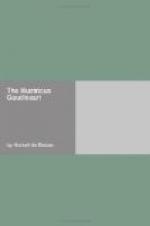As to the do-nothingness of that blessed land it is sublime and well expressed in a certain popular legend: “Tourangian, are you hungry, do you want some soup?” “Yes.” “Bring your porringer.” “Then I am not hungry.” Is it to the joys of the vineyard and the harmonious loveliness of this garden land of France, is it to the peace and tranquillity of a region where the step of an invader has never trodden, that we owe the soft compliance of these unconstrained and easy manners? To such questions no answer. Enter this Turkey of sunny France, and you will stay there,—lazy, idle, happy. You may be as ambitious as Napoleon, as poetic as Lord Byron, and yet a power unknown, invisible, will compel you to bury your poetry within your soul and turn your projects into dreams.
The illustrious Gaudissart was fated to encounter here in Vouvray one of those indigenous jesters whose jests are not intolerable solely because they have reached the perfection of the mocking art. Right or wrong, the Tourangians are fond of inheriting from their parents. Consequently the doctrines of Saint-Simon were especially hated and villified among them. In Touraine hatred and villification take the form of superb disdain and witty maliciousness worthy of the land of good stories and practical jokes,—a spirit which, alas! is yielding, day by day, to that other spirit which Lord Byron has characterized as “English cant.”
For his sins, after getting down at the Soleil d’Or, an inn kept by a former grenadier of the imperial guard named Mitouflet, married to a rich widow, the illustrious traveller, after a brief consultation with the landlord, betook himself to the knave of Vouvray, the jovial merry-maker, the comic man of the neighborhood, compelled by fame and nature to supply the town with merriment. This country Figaro was once a dyer, and now possessed about seven or eight thousand francs a year, a pretty house on the slope of the hill, a plump little wife, and robust health. For ten years he had had nothing to do but take care of his wife and his garden, marry his daughter, play whist in the evenings, keep the run of all the gossip in the neighborhood, meddle with the elections, squabble with the large proprietors, and order good dinners; or else trot along the embankment to find out what was going on in Tours, torment the cure, and finally,




